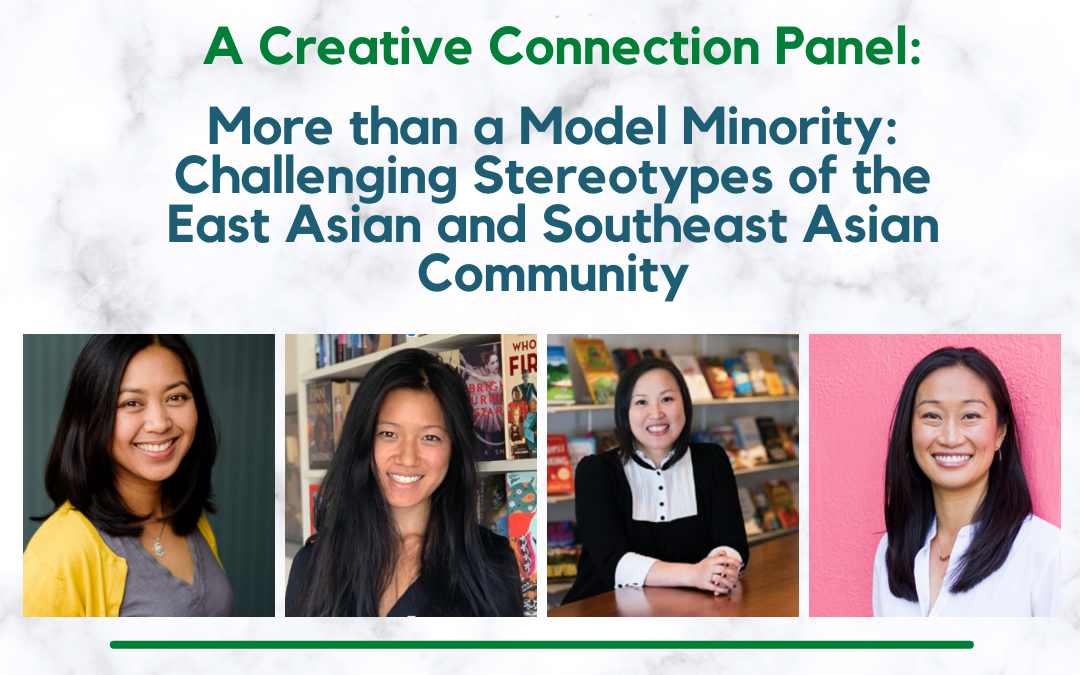The Writing Barn Creative Connections Series
At The Writing Barn, we believe deeply that the purpose of publishing is to be seen and heard, to have the tapestry of human experience communicated from writer to reader, heart to heart. It is time for deep and lasting change, and we are committed to learning, listening, and developing equitable programs and inclusive and exclusive offerings when needed.
We deeply appreciate Nicole Chen for her leadership during the panel as a part of our DEI committee and for her arrangement of key takeaways from the event, written below.
A little over a week after the Atlanta shootings that left eight people dead, six of which were Asian women, the Writing Barn hosted our second Creative Connections: A Tapestry of Diverse Voices panel, this time led by and for those of us in the East Asian and Southeast Asian community.
And thus, against the backdrop of violent hate crimes against the Asian American community, and despite our fear and anger (or perhaps because of it), we showed up. Author Nicole Chen moderated a frank, vulnerable, yet empowering conversation between panelists Wendi Gu, agent at Sanford J. Greenburger Associates, Jenny Bak, executive editor at Viking Children’s Books, and Mae Respicio, middle grade author of THE HOUSE THAT LOU BUILT, ANY DAY WITH YOU, and the upcoming HOW TO WIN A SLIME WAR.
Themes of the night included stories from the panelists’ personal experiences as Asian Americans living in the U.S., motivations for advocating for AAPI voices in publishing, what type of stories we can and should tell, and advice on how to approach collaborating with agents or editors that aren’t AAPI but allies. Below is a summary of some of the key takeaways:
- Given the events in Atlanta and rise in anti-hate crimes against our community, now more than ever, we must continue to be brave, vulnerable, and persistent in telling stories that provide both mirrors and windows into the Asian American experience for our children.
- The world needs more of our stories. Strength comes in numbers, so we should continue to write our stories because each one is unique and special. Asian America is NOT a monolith. One fear amongst writers of underrepresented communities is that if one topic is written about an element of our experience, then we can no longer write about it ourselves. But our perspectives, experiences, and approach to writing and/or illustrating are unique to each one of us and our individual voice. Rather than looking to what the market thinks it wants, or if a topic’s been already covered and thus “over quota”, we can and should show the breadth and diversity within the AAPI experience by embracing the topics that are the most dear to our own hearts. This is what will make our stories shine and connect with young readers.
- The stories we write can span geographies, cultures, and history. We can and should write stories about places, themes, histories, people, etc. that deserve more light and exposure within the white-American publishing landscape today. And we should write these stories for kids across all ages, from board and picture books to young adults and beyond. But we must also anchor on emotional resonance, on stories that connect to inherent human emotion. Kids need to see themselves in the stories we write, even if the environment and history is unfamiliar.
- We must advocate for ourselves and thoroughly vet the allies working with us to break down the white walls of publishing: While the publishing world is moving towards embracing more diverse stories, it remains a largely white establishment. There aren’t enough AAPI gatekeepers (yet!), although those in those positions are doing the hard and good work for us. Be bold and clear of your needs when evaluating who to work with, whether agents or editors, that aren’t from your world but have the empathy and sensitivity to empower you to tell your truth.
- One story at a time. When all else fails, channel your emotions, anger, despair toward perfecting your craft, one story at a time.

The panel ended with each of the panelists sharing book recommendations that exemplify the work that’s been done and we should continue to do as AAPI writers and illustrators. Please consider purchasing and reading these lovely stories!
- Jenny’s picks: From Little Tokyo With Love, by Sarah Kuhn, releases May 11, 2021 (YA); Girls of Paper and Fire Trilogy, by Natasha Ngan, 3rd book releases November 2021 (YA)
- Wendi’s picks: The Fearless Flights of Hazel Ying Lee, by Julie Leung, illustrated by Julie Kwon (PB); Minor Feelings: An Asian American Reckoning, by Cathy Park Hong (adult, collection of essays)
- Mae’s pick: How to Win a Slime War, by Mae Respicio, releases Sept 14, 2021 (MG)
- Nicole’s pick: Stand up, Yumi Chung! by Jessica Kim (MG)
Not part of a particular #ownvoices community
but want to contribute to that community regardless?
Consider donating as an ally HERE. While you might not be able to attend the event itself, you can still make a meaningful impact for that community and show your support via a donation.
A donation to our Diversity, Equity, and Inclusion Fund will go towards the following:
- Scholarships for BIPOC, LGBTQIA+ and Neurodiverse and Disabled writers.
- Funding DEI events and panels, including the Creative Connections Panel
Following Creative Connections Panel
Thursday, April 22nd: Elevating Queer Voices: LBGTQIA+ Writers in Community
Upcoming Creative Connections Panels
Thursday, June 24: Writing While Latinx: Getting Past the Gatekeepers
